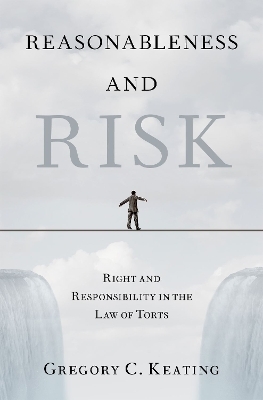
Reasonableness and Risk
Oxford University Press Inc (Verlag)
978-0-19-086794-2 (ISBN)
The law of torts is concerned with what we owe to one another in the way of obligations not to interfere with, or impair, each other's urgent interests as we go about our lives in civil society. The most influential contemporary account of tort law treats tort liability rules as shadow prices. Their role is not to vindicate claimants' own rights and interests, but to induce us to injure one another only when it is economically efficient to do so. The chief competitors to the economic view take tort law's importance to lie primarily in the duties of repair that it imposes on wrongdoers, or in the powers of recourse that it confers on the victims of tortious wrongs.
This book argues that tort law's primary obligations address a domain of basic justice and that its rhetoric of reasonableness implies a distinctive morality of mutual right and responsibility. Modern tort law is preoccupied with, and responds to, the special moral significance of harm. That special significance sometimes justifies standards of precaution more stringent than those prescribed by efficiency. This book also examines the regulatory and administrative institutions with which the common law of torts cooperates and competes, treating these as part of a continuum of institutions that instantiate the primary role pursued by modern tort law - that is, to protect our physical integrity and other essential interests from impairment and interference by others, and to do so terms that all those affected might accept as justifiable.
Gregory C. Keating is William T. Dalessi Professor of Law and Philosophy at the USC Gould School of Law and the USC Department of Philosophy. He is the co-editor of a leading tort law case book and the author of numerous articles on tort law, strict liability, negligence, harm, and responsibility.
Chapter One: Wrongs, Harms, and Costs
Chapter Two: The Priority of Responsibility Over Repair
Chapter Three: The Importance of Interests
Chapter Four: Fairness and Fault
Chapter Five: From Reparation to Regulation
Chapter Six: Strict Responsibilities
Chapter Seven: Enterprise Liability: Collective Responsibility and Commutative Justice
Chapter Eight: The Heterogeneity of Tort
| Erscheinungsdatum | 25.11.2022 |
|---|---|
| Verlagsort | New York |
| Sprache | englisch |
| Maße | 163 x 237 mm |
| Gewicht | 658 g |
| Themenwelt | Recht / Steuern ► Allgemeines / Lexika |
| Recht / Steuern ► EU / Internationales Recht | |
| Recht / Steuern ► Öffentliches Recht ► Umweltrecht | |
| Recht / Steuern ► Privatrecht / Bürgerliches Recht ► Besonderes Schuldrecht | |
| ISBN-10 | 0-19-086794-9 / 0190867949 |
| ISBN-13 | 978-0-19-086794-2 / 9780190867942 |
| Zustand | Neuware |
| Informationen gemäß Produktsicherheitsverordnung (GPSR) | |
| Haben Sie eine Frage zum Produkt? |
aus dem Bereich


